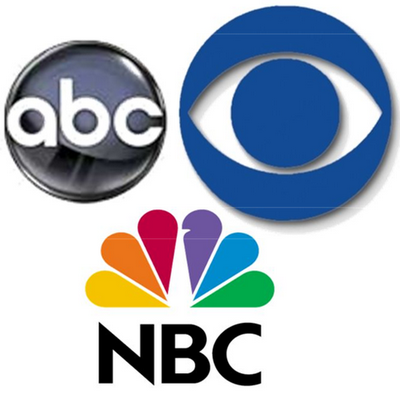Network News Dying: So What?
 NBC is the only network news program that’s not losing gobs of money, and that’s only because it has a 24/7 cable news outlet (MSNBC) to recoup its investment. ABC and CBS are continuing to cut staff to pare costs but have no plan to actually make money, aside from hoping CNN will agree to merge with them for no apparent reason.
NBC is the only network news program that’s not losing gobs of money, and that’s only because it has a 24/7 cable news outlet (MSNBC) to recoup its investment. ABC and CBS are continuing to cut staff to pare costs but have no plan to actually make money, aside from hoping CNN will agree to merge with them for no apparent reason.
If any of this is news to you, NYT goes into this in some detail.
So what?
Network news divisions have historically been family jewels for their parent corporations, lending prestige and an aura of public service — as well as a shield against government intrusion. Mr. Heyward called the network evening newscasts a “bastion of serious news coverage at a time when so much of television has become tabloid and trivial.”
[…]
A survey by the Pew Research Center last year reported that three-quarters of respondents thought the cancellation of the evening newscasts would be an “important loss” to the country. Mr. Rosenstiel said, “None of these news division presidents wants to be the first guy to kill an evening newscast.”
Look, I think it’s important to be in good shape, too, but that doesn’t mean I’m going to quit sitting on the couch drinking beer. People are theoretically in favor of a lot of things that are supposed to be good for them — broccoli, C-SPAN, classical music, exercise — but that doesn’t mean they’re actually going to choose them over more hedonistic alternatives.
Network news shows used to compete against other network news shows and maybe “Leave it to Beaver” reruns on UHF. Now, most of us have 200 other choices from sports to sitcoms to home repair. That’s cut into the network news monopoly.
Furthermore, those of us who are news junkies have plenty of choices, too. If I really wanted to watch someone read me the news, I’d pick Jim Lehrer. Since I don’t, I choose the internets.
Still, the networks persist in trying to save a loss leader that few really want:
Mr. Westin said ABC News could no longer afford to support a worldwide staff of about 1,500, with bureaus in cities foreign and domestic, most with traditional TV news work forces: camera operators, sound engineers, tape editors, assignment editors and, of course, correspondents, many with substantial salaries.
More journalists will become jacks-of-all-trades, wielding cameras, microphones and lights, as well as lists of interview questions. More production work will be conducted out of New York. “The ones who fear the most from the cuts are the ones that have a single function,” one ABC staff member said.
Mr. Westin said high-priced and purely cosmetic talent would become an increasingly endangered species. “There have been people in television news — very successful people — who do not write,” he said. “We are going to definitely require more of our journalists.”
Mr. Westin said he did not think the cuts would compromise ABC’s journalism, but not everyone shares his confidence. One veteran ABC News executive said, “Clearly the signal is: It’s not important to create anything new. We simply have to figure out a way to manage it cheaply.”
Or, how about this: Cancel the show. That’s what you’d do with any other show whose ratings were flagging and whose production costs exceeded the ability to sell advertising over a long period.
Oh, but nightly newscasts bring prestige! Really? Does Katie Couric really have the same gravitas that Walter Cronkite — or even Dan Rather — carried? Ditto whoever’s currently doing the news for ABC and NBC vs. David Brinkley and John Chancellor? No. And it’s not that the new gang isn’t talented and competent. Or even that they haven’t come up as war correspondents. No, it’s simply that they’re not in our living rooms every night and therefore don’t have the cultural impact that their antecedents of even twenty years ago did.
And they never will again.
So, get over it. Focus instead on, oh, entertaining programming. Because you’re about to be obsolete in that department, too, with USA, SyFy, and HBO making the best shows on television.




Don’t leave out AMC. Mad Men and Breaking Bad are both AMC productions.
Are they allowed to cancel the show? Once upon a time stations were required to broadcast a certain amount of news in order to retain their FCC licenses. I’m not aware of this changing (although I could have missed it).
Is there anything substantively different between the three networks news coverage? I don’t think so, these are stylistic differences and personality appeal. If you want to make your news program competitive, you may want to think about doing something completely different than your competitors.
Reminds me of this I read recently:
When CBS put Katie at the helm they lost me, when NBC put Brian in charge they lost me, and when ABC put Diane at the top spot they lost me. In none of the cases it is gender issue or personality. I just don’t want to see second fiddle in the top spot. All three spent years doing inconsequential background pieces, “politics,” or serving as a “straight man” to the big guy. They were well developed as second rank, and it was clear that if they were top rank they would not have had to wait for a the big guy to retire for them to get the big job.
All three got the job not because they grew to fill it, but because the job shrank to fit them.
The Atlantic’s writing really has deteriorated, hasn’t it, Andy?
I’m a sort of news junkie, but my feeds are pretty much split between economics and hobby electronics. That keeps me entertained, but I recognize that it isn’t that balanced, and doesn’t give me the same cultural connections as 70’s network TV. (I remember when *everybody* talked about 60-minutes the next morning.)
I heard people talking about killer whales this week, and for a day or two had no idea why …
They’re screwing up the entertainment portion of programming as well. I’m tired of a new show one week followed by a rerun, the a new show, then a rerun. We also get a dead zone every summer. Network programming is losing us all. It’s model that’s been around for 40, 50 years? Time to change.
I think it’s worth talking about why network news viewers are going elsewhere in droves. PD Shaw, above, is on to something in saying there’s no real difference between them. They run pretty much the same stories, in the same sequence, saying the same things about the topic for at least the first half of each broadcast.
As for gravitas, Walter Cronkite,Dan Rather, David Brinkley and John Chancellor had it because they frequently informed us about the topics under discussion. We felt we could depend on them to tell us the truth. Every broadcast was not a he said-she said deal that treated all sides as equally right.
Broadcast news, like print news, is failing because they are less and less connected to our lives. Overwhelmingly, they do not provide us with the information we need to makes decisions on important subjects. We used to depend on the news to tell us what we needed to know about things, to give us a basis from which we could judge the value of a politicians pronouncements. Now, not so much.
So fewer and fewer people watch. Why bother?
That’s been the path to the anchor desk for some time now. Tom Brokaw came up from Today, for example.
“…only because it has a 24/7 cable news outlet (MSNBC) to recoup its investment.”
LOL! What planet are you living on? MSNBC hardly rates a blip on the ratings line. The channel runs prison documentaries on the weekends, fer chrissake! Billed as “The Place for Politics” or something, it’s star idiot, Keith Olbermann, has seen a 47% ratings drop from Jan 2009 thru Jan 2010; hardly a cash cow for advertising rates.
Nice (!!) to see ABC acknowledging a change that the BBC acted upon some 15 years ago. There’s simply not the luxury to have highly-paid talking heads scattered around the world. More and more, the BBC journalists combine the functions of reporter, cameraman, sound engineer, and producer into one person. That person can be assigned abroad or sent there very quickly and cheaply.
This is the result of advances in technology, of course. Laptop PCs can handle all the editing and transmission needs that once required studios. Satellite phones replace dishes where hardwired broadband isn’t available. HD video cameras, running around $100 a pop can, in many instances, replace equipment costing tens of thousands.
As the ironic TV coverage of the Pacific tsunami showed, this back-pocket technology isn’t (yet) a perfect replacement for the expensive gear. It’s getting there, though, and in some instances is perfectly interchangeable.
They had gravitas because they were the only thing on. There was no entertainment option during the news hour, just a choice between them. Plus, when they were big, the network news was the hot off the presses way to get the news. It was either that or wait for the paper in the morning. Now, we can learn of events before and in spite of the journalists.
When I occasionally watch network TV in the evening, the local station has a promo with the weather person say, “What will your morning commute be like, tune in at 11 and I’ll tell you.” I can’t help but think each time, “or I can log on get a detailed forecast and avoid the interminable wait for you to get to the point in your broadcast.
Here’s an idea, presented in a semi-satrical vein:
A network should fire EVERYBODY in its news division aside from highly technical individuals and a few extremely talented managing-editor types. The former are there to provide the infrastructe for news. The latter should be proven reporters who are also dynamite managers with a proven ability to motivate their staffs to perform 110 percent.
For the actual reporting and anchor positions, hire a fresh crop of journalists. None of these journalists should have more than three years of experience. In fact, the less experience the better. Why? Sop they don’t have all the bad habits journalists develop over their careers.
Build up these new teams, teach them good journalistic practices, and put the legacy reporters out to pasture.
Really? I’d pick Sofia Vergara…
What? You said “watch” & “read (to) me”, why not enjoy it if you’re gonna be passive about it?
I used to be a television news junkie-before the internet really took off and I discovered how easy it is to get 90% of my news at my leisure. I actually find that I don’t have time to watch TV during the main news hours-that is usually-go pick kids up or take kids to sports practices/activities and cook dinner time. I am also not convinced we need to have an hour or an hour and half of local news. About the only thing I might watch on local news is the weather.
They’re screwing up the entertainment portion of programming as well. I’m tired of a new show one week followed by a rerun, the a new show, then a rerun.
I completely agree with this. There aren’t a whole lot of shows I watch, but it is annoying to have one or two weeks of new episodes and then one or two weeks of reruns. I can understand taking a break between Thanksgiving and Christmas-given that a lot of people are busy doing other things, but there is one show I watch that showed two new episodes in January, a couple reruns, a new episode and then went back to reruns.
I think that there are two distinct issues here. First is the news programs themselves and second is the anchors. I think that the first has been well covered. As serious news-junkies have more and more places to get their news, we rely less on nightly news and even cable news channels. That’s one of the reasons that cable news has taken the shift to opinion… a bombastic guy in front of a camera is harder to replicate on the web.
As for the anchors… well, they’ve lost gravitas not because of who they are compared to who they used to be but rather (I think) because the curtain has been lifted and we’ve come to realize that the anchors are people reading from a teleprompter. This is no less true for Williams than it was for Brokaw, but with each scandal it’s become apparent that the anchor is simply reading off someone else’s script.
They’re screwing up the entertainment portion of programming as well. I’m tired of a new show one week followed by a rerun, the a new show, then a rerun.
I’m coming around to the cable model. For Burn Notice, they run half a season, then a break of a few months, then another half-season. NBC talked about moving away from the fall-spring schedule (Leno was supposed to help with that), but I haven’t seen much actual movement in that direction except on their cable programming.